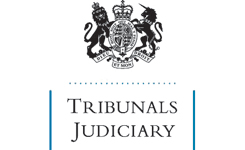|
Notes:
|
Reported with [2010] UKUT 264 (AAC)as [2011] AACR 15.
Tribunal procedure – fair hearing – Article 6 of the European Convention on Human Rights – whether hearing in mental health case should be held in public at request of applicant
The applicant was detained at a high security hospital pursuant to sections 37 and 41 of the Mental Health Act 1983. He had a mental disorder classified since September 2008 as a psychopathic disorder. Prior to that date his mental disorder had been classified as mental illness and psychopathic disorder. He had been continuously detained under the Act for over 23 years. He applied to the First-tier Tribunal (mental health) for discharge and for his appeal to be heard in public, so that the public could be aware of what he saw as failings in the system, especially in relation to his diagnosis. Rule 38(1) of the Tribunal Procedure (First-tier Tribunal) (Health, Education and Social Care Chamber) Rules 2008 provides that hearings must be held in private unless the tribunal considers that it is in the interests of justice for the hearing to be held in public. The tribunal heard evidence from two medical experts, one of whom expressed concern at the possibly adverse effect of negative publicity in the longer term, while the other thought that those considerations were on balance outweighed by the negative impact of refusing a public hearing. The tribunal found that a public hearing would be unlikely to attract much if any media interest, but thought “adverse or no publicity” would be a serious disappointment, and hinder the patient’s progress in the longer term. The Upper Tribunal granted permission to appeal. It was common ground that the Upper Tribunal had jurisdiction to hear an appeal against the decision to refuse a public hearing.
Held, in an interim decision, that:
1. any exception to the open justice principle in Article 6(1) of the European Convention on Human Rights must be clearly justified and, although in the generality of cases the protection of the interests of mental health patients will justify an exception to that principle, the main consideration is the protection of the interests of the patient (paragraphs 16 to 28);
2. the tribunal had started from the wrong point in relying on what it described as “relevant principles”, which were not so much principles as reasons given by eminent judges to justify the general principle of open justice, instead of directing attention to Article 6 and its exceptions. It is a fundamental principle, both in common law and in Article 6, that open justice is a right, which does not require justification on a case by case basis and that it is the exceptions which need to be justified (paragraphs 41 to 43);
3. the factors to be considered in any application for a public hearing are: (a) whether it is consistent with the subjective and informed wishes of the patient (assuming that he is competent to make an informed choice); (b) whether it will have an adverse effect on his mental health in the short or long term, taking account of the views of those treating him and any other expert views; (c) whether there are any other special factors for or against a public hearing; (d) whether practical arrangements can be made for an open hearing without disproportionate burden on the hospital or relevant authority (paragraphs 29 and 44);
4. applying those factors to the present case: (a) was clearly satisfied as the applicant had waived his right to privacy and there was no dispute that he was able to make an informed choice; although the arguments under head (b) were finely balanced, and reflected a degree of speculation, the views of the patient himself, supported by his own expert, should carry considerable weight in the absence of other countervailing factors, and factor (c) was satisfied because the case was out of the ordinary and for that reason merited special consideration, in that the patient had been kept in detention at public expense over 23 years, often in conditions of high security, and there had recently been a change in his diagnosis, which potentially gave the case some heightened public significance (paragraph 45 to 48).
The Three-judge Panel set aside the decision of the First-tier Tribunal and directed a further hearing by the Upper Tribunal to consider evidence as to practicalities and costs, previous practice, and practices elsewhere in the United Kingdom, in Europe and in other common law counties.
Held, in a final decision following a further hearing, that:
5. once the tests in (2) above for establishing a right to a public hearing have been satisfied, Article 6 of the European Convention on Human Rights (reinforced by article 13 of the Convention on the Rights of Persons with Disabilities) requires that a patient should have the same or substantially equivalent right of access to a public hearing as a non-disabled person who has been deprived of his or her liberty and such a right can only be denied a patient if enabling that right imposes a truly disproportionate burden on the State (paragraph 22);
6. how the right to a public hearing can practically and proportionately be achieved will depend on the facts of each individual case, including the facilities available in the hospital in question (paragraph 23).
The Panel directed that the First-tier Tribunal hold a public hearing of the applicant’s appeal at which the applicant and his representatives were to be enabled to attend in person in the same hearing room as the hearing took place.
|
